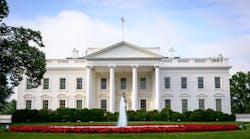The US oil export ban is no more. The end of the embargo was part of the spending deal hammered out by the House of Representatives and Senate and signed by President Obama on December 18.
The US oil industry had been pushing hard for ending the useless, outdated ban. The action comes at a good time and should have a broad positive impact on the US economy.
American Petroleum Institute President and CEO Jack Gerard thanked House and Senate members who voted to end the 40 year old crude oil export ban. "This was a big win for the American people that made history with a strong bipartisan vote,” he said. “House and Senate lawmakers showed leadership by strengthening our nation's energy future. The United States is now the world's largest producer of oil and natural gas, and Americans are enjoying an energy renaissance that has produced abundant supplies of domestic energy resources.
Oilfield service companies also embraced the lifting of the ban on exports of US crude oil. "This is a historic day, and one that is long overdue," said Dan K Eberhart, chief executive officer of Canary, LLC, one of the largest private oil field service companies in the country. "I applaud our lawmakers for their dedication in staying the political course and finally lifting this ban. I'm eager to see the benefits unfold from this policy change."
The US crude oil export ban was first enacted on December 22, 1975, in response to the infamous Arab Oil Embargo of 1973. The decision by the members of the Organization of Arab Petroleum Exporting Countries, in addition to Egypt and Syria, to cut off their oil exports to the United States, crippled our economy and sent gas prices soaring. According to Eberhart, the export ban may have been the right move then, but it is not the right move now.
"The energy landscape in this country is vastly different than it was in the mid-70s," he said. "Energy production in the United States is on track to outpace our own domestic needs, and we may not even need to import any oil by the 2030s."
He added that lifting the ban is not just a boon for the energy industry; it's good news for all Americans. "This represents a gesture of international goodwill by our country and demonstrates our clear commitment to free and fair trade," Eberhart said. "This puts us in a strong position to counter foreign nations' aggression toward our allies because we are now able to present ourselves as an alternate and reliable supplier of crude."
Alongside this, the policy change will also affect US national security. "We now have the ability, at our discretion, to curtail, increase, or even put a temporary hold on our country's crude exports. This means that if we, our allies, or any neutral nation are in trouble, we have a domestic energy surplus to depend on and leverage in our favor or on behalf of other nations," Eberhart said. "In terms of our security at home and that of our friends overseas, that's a game changer."










